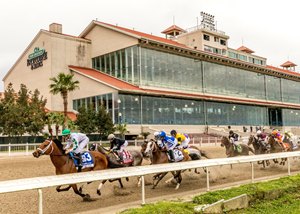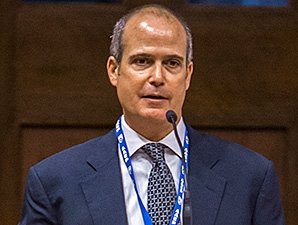Horsemen in Limbo After Fair Grounds COVID-19 Closure


Throughout the world, people are reeling from the COVID-19 pandemic, either from its health risks or from its crippling of the global economy.
The equine industry, like so many others, has not been spared. Cancellations or postponements of numerous 2-year-olds-in-training sales have dealt a blow to horse sellers, the ripple effects of which will likely be felt at yearling sales later in the year. Racing has been upended by the suspended race meets and the entire cancellations of others, such as that of Keeneland in Lexington.
One of the latest to cancel their meet due to COVID-19 was Fair Grounds Race Course & Slots in New Orleans, which terminated its meet approximately a week early after the completion of racing March 21, the day of the Twinspires.com Louisiana Derby (G2). It had been conducting racing without spectators like other tracks still in operation across the United States.
Where the horses at Fair Grounds go next is uncertain. Many tracks around the country not currently in operation have delayed or placed restrictions on horses and stable staff entering their premises, citing safety concerns related to COVID-19.
Keeneland, for example, where some Fair Grounds horsemen typically race in the spring, has closed its backstretch to new additions and Churchill Downs in Louisville, Ky., has established a delayed target date of April 14 to open its backstretch. It typically opens in mid-March.
Stable gates are also closed to the transfer of horses to Evangeline Downs and Delta Downs, Louisiana tracks owned by Boyd Gaming, which won a temporary restraining order last week from a Louisiana court that challenged aspects of an emergency regulation issued from the Louisiana Racing Commission. That LRC regulation, which passed March 20 for a period extending to 30 days, called for horsemen and horses to be able to shelter in place at their current racetracks and allowed for the customary movement of horsemen and horses.
As a result of the temporary restraining order, the shelter-in-place provision still stands but the customary movement of horses does not.
Many trainers at Fair Grounds have their horses in essentially a holding pattern, as they try to find scarce racing opportunities at tracks still racing, such as Oaklawn Park in Arkansas, or availability of a place where they could stable and train. There is no established date for when horses need to vacate Fair Grounds, said Mike Ziegler, executive director of racing for Churchill Downs Inc., which owns the track.

"Stabling and training are going to be allowed for horsemen that are currently stabled there," said Ziegler.
After this week, training will be scaled back to four days a week at Fair Grounds.
"The New Orleans division is kind of stuck in New Orleans," trainer Mark Casse said over the weekend. "A guy in our barn, I don't want to say his name, but he had a big stable and he let all his people go and is putting his horses on the farm. We're going to do our best to keep everybody and ride it out."
Finding a boarding facility for a horse off the racetrack is becoming increasingly difficult, said owner Maggi Moss. Her usual lay-up facility, LaCroix Equine in La Grange, Ky., only had room for one horse when she contacted them this week regarding availability for five horses, she said. She was able to eventually secure spots at Bluegrass Equine Center in Salvisa, Ky., upon the efforts of her trainer, Tom Amoss.
"Any owner, whatever position they're in, this is a constant moving target," said Moss. "Trying to make the right decisions is challenging. I know the one right decision is to make sure these horses are safe, taken care of. Don't panic and try and be smart. There is nothing else you can do.
"I have a grave concern for all the horses and people that are really strapped right now, and what's going to happen to them. It's no different than dogs and cats with the horses. I'm not diminishing the health problems for people. But it's a real crisis for the animals, too, right now."
Bernard Chatters, president of the Louisiana Horsemen's Benevolent and Protective Association and a trainer at Evangeline Downs in Opelousas, La., believes that Boyd Gaming has lost sight of the needs of horses and their caretakers through the COVID-19 outbreak. On March 16, he said the company initially told the people stabled on its properties to vacate with their horses within 48 hours, an announcement that roughly coincided with the closure of its gaming operations at the two racing/casino properties.
Boyd Gaming ultimately changed course, allowing those already stabled to remain. Elsewhere in the country, Indiana Grand Racing & Casino in Shelbyville, Ind., also reversed similar actions for different ownership last week.
"Those with most to gain in terms of profits want to do the least in a time of crisis. That's really unfortunate," Chatters said.
David Strow, vice president of corporate communications for Boyd Gaming, said their "concern is the safety of our team members," noting the company has been following shelter-in-place mandates issued by government officials to reduce the spread of COVID-19.
Many states have restricted businesses in operation to those providing essential services, and that a horse racing facility is "not essential to operate at this time," he added.
In a conference call with the LRC last week, a track representative from Fair Grounds mentioned that dense housing and working conditions for a full Fair Grounds backstretch made it challenging to maintain COVID-19 safety protocols. They sought to have some horses exit their grounds.
According to Chatters, Evangeline backstretch operations are being handled by a small staff that Bowd Gaming outsourced to complete the needed tasks of backstretch security and upkeep.
Ron Faucheux is one of those trainers that would have transitioned from Fair Grounds to Evangeline and also to Lone Star Park in Texas. Instead, he's currently working to maintain employment for his staff while seeking to keep costs to his owners low at Fair Grounds, where he was the second-leading trainer at the meet.
He said he trained only three of approximately 30 horses he currently has at Fair Grounds March 24. The rest walked. He stabled more than 40 horses during some stages of the Fair Grounds season.
Not all tracks and training centers in the south have closed their doors. Louisiana Downs in Bossier City, La., "should be commended" for accepting horses, Chatters said, and Highlander Training Center in Texas issued a statement of stabling availability on March 24.
"With the early conclusion to live racing at Fair Grounds and Sam Houston Race Park, along with the later opening of the stable area at Lone Star Park, Highlander Training Center is here to assist any horsemen needing a place for lay-ups or in-training horses," the statement read.
Racetracks in Florida continue to race, though shifting horses from Louisiana to Gulfstream Park is not an option, said trainer Mike Maker, who has divisions of horses in numerous states.
"We're not shipping to Florida because they're not taking out-of-state horses," he said of his Fair Grounds stable. "A few of those might go to Oaklawn, and I'm going to enter a few of them for closing day at Turfway. And then I have some Louisiana-breds that may go to the farm.
"At this point, nothing surprises me. I'm taking it day by day because the minute you make some plans, it changes."
Additional reporting by Claire Crosby
